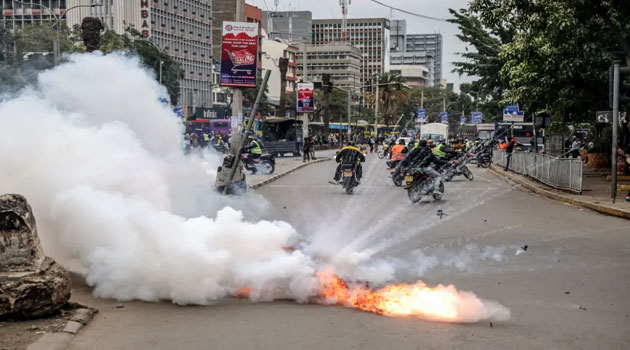
Ruto slammed for using terror laws to crush protesters
NAIROBI, Kenya July 21 – President William Ruto’s government is under intense criticism after slapping anti-government protesters with terrorism charges, a move critics say is meant to intimidate and silence dissent as public discontent grows.
By invoking the Prevention of Terrorism Act, a law crafted to combat groups like Al-Shabaab the state has drawn sharp condemnation from rights groups, lawyers, and opposition leaders who argue the legislation is being twisted to criminalize protest.
“Labeling protesters as terrorists is not only unjustified but dangerous. It risks eroding constitutional freedoms,” said Hussein Khalid, Executive Director of Haki Africa.
President Ruto’s government is under increasing pressure from Kenyans frustrated by high taxes, rising costs of living, and what many see as broken promises.
Instead of addressing the grievances, critics say the government is choosing a path of criminalization.
Nearly 1,500 people have been arrested since June 2025, with dozens charged with terrorism and malicious damage to property.
The Office of the Director of Public Prosecutions (ODPP) in a statement on July 21, 2025 defended the charges, saying:
“Preliminary investigations indicate that attacks on public offices, courts, police stations, and government personnel were not spontaneous demonstrations, but calculated and coordinated acts of violence aimed at crippling essential government operations.”
The ODPP added that all accused individuals will be accorded a fair trial and due process.
Interior Cabinet Secretary Kipchumba Murkomen insisted that the government was acting within the law.
“The recent unrest was raw and unprecedented terror unleashed by marauding gangs of looters and barefaced anarchists,” Murkomen said.
Activist Boniface Mwangi’s arrest has intensified the debate. He was picked up from his Lukenya home on July 19, 2025 and was initially set to face terrorism charges.
However, the ODPP later dropped those charges and instead accused him of illegally possessing ammunition and teargas canisters.
Siaya Governor James Orengo criticized the state’s move, saying, “It is illogical and deeply troubling that an activist like Boniface Mwangi could be charged with terrorism for participating in protests.”
Mwangi, who on Monday pleaded not guilty, was released on a Sh1 million bond.
Rights groups argue the swift downgrade of charges against him shows the government’s terrorism claims cannot hold up under scrutiny.
Civil society organizations, including the Police Reforms Working Group, have condemned the state’s actions, warning of a shrinking democratic space.
“The government is weaponizing anti-terror laws to silence dissent,” the group said in a statement, calling for the immediate withdrawal of terrorism charges against protesters.
Legal experts say applying the Prevention of Terrorism Act in this context marks a bad precedent.
Frustration across the country is boiling over, and observers say the government’s heavy-handed approach could backfire politically.
With the 2027 elections creeping closer, many are starting to wonder if President Ruto’s team is running out of ideas and turning to force as a way to cling to power.